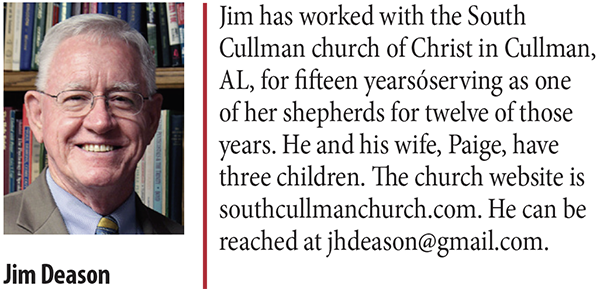by Jim Deason
Synopsis: Communication within the eldership is like blood to the body—it brings life. It reduces stress and increases energy. It provides for a stronger immune system and results in faster healing.
The first mention of elders in the New Testament church is in Acts 11:29-30, “In the proportion that any of the disciples had means, each of them determined to send a contribution for the relief of the brethren living in Judea. And this they did, sending it in charge of Barnabas and Saul to the elders.” This term is rich in Old Testament tradition and pregnant with meaning. It is clear from the teaching of the New Testament that God intended that there be elders in every church (Acts 14:23). In churches where no elders exist, something is “wanting” (ASV) or “lacking” (Titus 1:5 NKJV).
In the New Testament, local churches always had a plurality of elders (Acts 14:23; 20:17; Phil. 1:1), never just one! In meeting the qualifications of 1 Timothy 3 and Titus 1, these are deeply spiritual men. They are capable, through their collective wisdom and insight, of overseeing, shepherding, and ruling the church of God (Acts 20:28; Heb. 13:17). No one elder has any more authority than any other member of a local church, but within the eldership as a whole there is delegated decision-making authority and shepherding responsibilities that require a willingness and ability to work together. Group dynamics may vary a bit because of specific personalities, but there are common principles that can and should guide each eldership in functioning as a unit. The thoughts mentioned here are not exhaustive, but serve as a good starting place to enable an eldership to work together profitably.
Every decision, every act of shepherding a weak, wandering, or lost soul must be viewed through the prism of divine revelation. The Scriptures are inspired by God to equip us for every good work (2 Tim. 3:16-17). This principle is easy to express and even easier to forget. Various factors go into the process of making important decisions: The consequences of a decision, who is going to be affected, and how, etc. These are important considerations. They are normal and appropriate. Our polar star, however, must always be “Is what we are doing pleasing God? Are we doing the right thing and leading the church in the right direction?”
Someone once said that “communication is to a relationship what blood is to the body—it brings life.” In no relationship is this more important than in an eldership. Consider this from two standpoints: First, it is vitally important that elders communicate with one another. While there may be a rare exception (maybe when someone is in the process of revealing a confidential matter that is being worked through, etc.), all the elders need to be aware of things that are going on in the congregation. Intentionally withholding information from one another can destroy trust, while open communication strengthens it.
Second, communication is important between the eldership and the congregation. In administering money collected from the churches of Macedonia and Achaia for the relief of brethren in Judea, Paul and his companions “(took) precaution so that no one will discredit us in our administration of this generous gift; for we have regard for what is honorable, not only in the sight of the Lord, but also in the sight of men” (2 Cor. 8:20-21). Elderships should approach their congregational responsibilities in a similar manner: Transparency is a good thing. It applies not only to business decisions but also to matters relating to discipline, etc. If you want to motivate people to take part in the work of the church, they need good communication from their leaders. When an eldership paints a good picture of work to be done and the beneficial outcome of their labor, people usually join in with enthusiasm. On the other hand, weak communication frequently leads to failure and disappointment.
Earlier we mentioned the fact that no one elder has any more authority than any other member of a local church. When an elder goes rogue, makes a unilateral decision, and communicates to the congregation without considering the views of the other elders, it creates serious tension and, sometimes, outright division.
It is not unusual for someone to ask an elder, “Could we ______ (fill in the blank)?” and then expect an immediate answer. It is easy for one to offer an answer, while assuming that he knows the feelings of the other elders. Wisdom and common courtesy, however, cry for you to not commit your fellow elders to a course of action without first consulting them. To do so in a moment’s weakness and without forethought is bad enough, but to act intentionally while knowing that the other elders would not approve is problematic and perilous.
Experience has taught me that working with elders whom you trust is a wonderful thing. Trust among elders, as in any other relationship, is built up gradually, brick-by-brick, on the small decisions made together on a daily/weekly basis. In particular, trust is strengthened as you see each other operate in crisis mode and realize, ultimately, that you think the same way. The approach may be slightly different from one man to another, but each desires the same outcome. Learning one another, respecting each other, and working through problems together builds trust. The ability to rely upon and trust your fellow elders brings two blessings: (1) it strengthens the eldership as a whole, and (2) the congregation will rest easy in the knowledge of this trust.
Let’s face it, we don’t always agree with one another in matters of judgment. Paul taught the Corinthian church to “agree” and “be made complete in the same mind and in the same judgment” (1 Cor. 1:10). If this is expected in the church as a whole, it certainly must be true within the eldership. So, we must develop consensus of thought. Unfortunately, I’ve seen one elder hold other elders hostage on a matter of personal judgment and be unwilling to budge. It is very difficult to work with someone like this, especially when it happens repeatedly.
Further, when an eldership allows this to happen, it has the potential to turn the eldership into a one man show destroying the reason for having an eldership in the first place. Compromising truth is out of the question, but the ability to build consensus by learning to come to agreement is vital to the health of an eldership, even and especially when your will bows to that of others.
Perhaps it’s not always possible, but maintaining a united front needs to be the rule rather than the exception. When an eldership makes a decision, and you are the lone dissenting voice, supporting your fellow elders is the right thing to do. Saying publicly, “Well I went along with it, but . . .” is never healthy or helpful. Furthermore, if you take this approach, and their collective wisdom turns out to be the obviously right decision, then “you’ve got egg on your face.” Learn to support one another.
The work of shepherds is to feed and tend sheep; to seek and search for the one who is lost to bring him safely back into the fold. That is a big job! Don’t lose sight of it. Perhaps you have heard it said that “some preachers do the work of elders, the elders do the work of deacons, and the deacons do nothing at all.” If that happens, and regrettably sometimes it does, those charged with overseeing the flock are at fault. Elders/shepherds should stick to the work they’ve been charged to do, empower the deacons to perform their tasks, and encourage initiative in the other members. Use your time effectively by shepherding souls.
By doing this, God will be glorified, churches will be unified, and individual disciples will be edified and bear much fruit.


